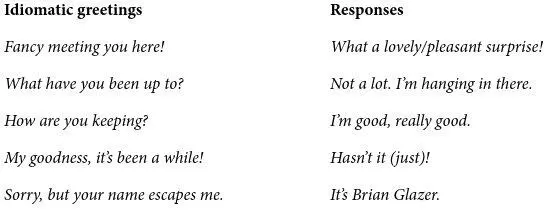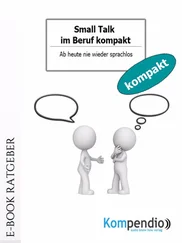2. I thought you were someone.
....................................................................
3. I can’t we haven’t met before!
....................................................................
4. I’m sorry, but can you my memory?
....................................................................
4 The following exchange did not go well! Rewrite it to make it more polite.
Paula:It’s Jonathan, right?
John:No, not Jonathan. John.
Paula:I’m Paula Reed. We met at the conference in Hong Kong.
John:I don’t remember you.
Paula:We sat next to each other at the dinner.
John:It’s possible.
Paula:It’s good to see you again.
John:Is it?
Try again, John.
Paula:It’s Jonathan, right?
John:..........................................................
Paula:I’m Paula Reed. We met at the conference in Hong Kong.
John:..........................................................
Paula:We sat next to each other at the dinner.
John:..........................................................
Paula:It’s good to see you again.
John:..........................................................
5 Complete the dialogues with key phrases.
1 A:You’re Rio, right?
B:............................................................
A:Oh, I’m sorry. I thought you were someone else.
B:............................................................
2 A:Hi. You must be (your name).
B:............................................................
A:I recognized you from the website.
B:............................................................
A:I’m Ioannis Papandreou. From Finance.
B:............................................................
Language focus: ‘Remember’ or ‘remind’?
The verbs rememberand remindmay come in useful when you meet someone you know. Do you know the difference?
Remember
● If you remember people, events or things, you know them. You have an idea of them in your mind and are able to think about them.
I’m really sorry, but I can’t remember your name.
● Rememberis followed by the -ingform of the verb when you talk about things you did in the past.
Oh yes , I remember talking to you in Prague .
Remind
● If you remind someoneabout something, you make that person remember it.
Could you remind me again where we met ?
● If you say that someone reminds you ofanother person or thing, you are saying that they are similar to them.
You remind me of a colleague of mine.
Idiomatic language
For non-native speakers, idiomatic language can be difficult to understand. Listen out for idiomatic greetings and notice how people generally respond. At first, you may not feel confident enough to use such expressions, but you should expect to hear them and be able to react to them.

Scenario
Brian:Fancy meeting you here, Louise!
Louise:Brian! What a pleasant surprise! Long time no see! Gosh, how long has it been?
Brian:Too long! At least a year. What have you been up to?
Louise:Not a lot, really. What about you?
Brian:Oh, hanging in there, you know.
Tips: Reconnecting with people
If you have already been in contact with people, you need to reconnect with them when you meet face to face. Here are some tips.
Do’s
● Say your name – in case they don’t remember it.
● Shake the person’s hand. If you know the person reasonably well, double-cheek kisses are common between women. However, men should wait for a woman to signal that kisses are OK.
● Make the first move if you think you know someone. If you are right, you will make someone feel good. If not, you will make a new contact. You have nothing to lose!
Don’t’s
● Don’t worry if you have forgotten someone’s name. Instead, try to recall a few details about your last meeting; this will make your forgetting the name less impolite. And do ask them to remind you of their name. If you avoid using their name altogether, it might be obvious that you have forgotten it.
● Don’t forget to say how you know the person. If it is a surprise meeting, they may need a polite reminder.
● Don’t feel bad if someone doesn’t remember meeting you before. It happens.
Next steps
Have you ever thought about how you like to learn? Do you like to work with visuals such as pictures or videos? Do you learn better when you listen to new language? Or do you need to do something active to learn? It is a good idea to try out a variety of learning styles and find what works for you. Here are a few suggestions.
● When you write down the language you would like to learn, use pens of different colours to highlight difficult words or expressions.
● Draw pictures to help you to remember vocabulary. Or imagine a situation where you could use the vocabulary and visualize the scene. Where are you? What are people wearing? How are they standing?
● Listen to the audio recordings of key phrases and scenarios online. As you listen, pause the recording and repeat the phrases.
● Record yourself on your smartphone. Listen to yourself and think about how you speak. Are you too fast or too quiet? Do you sound enthusiastic or bored? Be honest!
● Write vocabulary and key phrases on cards and keep them on your desk. Use two cards for each key phrase. Write half a phrase on one card and the rest of the phrase on another card. Then play ‘Memory’ during your coffee break. Put all the cards face down on a desk. Turn over one card and then turn over a second card. Do they make a key phrase? If they do, keep them. If they don’t, turn them both over, shuffle the cards and start again.
● Learn vocabulary while you are travelling. Buy different coloured envelopes for your vocabulary cards. Put the cards with the vocabulary you don’t know in a red envelope, the vocabulary you aren’t sure of in a yellow one and the vocabulary you know well in a green one. Move the cards to different envelopes as you learn the vocabulary.
● Write key phrases on pieces of paper and stick them on the fridge in your kitchen.
 Go to www.collinselt.com/businessresourcesto listen to the real-life audio for this chapter.
Go to www.collinselt.com/businessresourcesto listen to the real-life audio for this chapter.
Читать дальше


 Go to www.collinselt.com/businessresourcesto listen to the real-life audio for this chapter.
Go to www.collinselt.com/businessresourcesto listen to the real-life audio for this chapter.










